by FBNQuest Research
CBN data show that Nigeria’s gross official reserves declined by USD280m to USD34.82bn in March. In the name of accuracy, we should adjust this figure downwards to allow for the pipeline of delayed external payments, which the IMF estimated late last year at up to USD3bn and which the CBN has since indicated as substantially lower. We do not view the current level of reserves as a cause for alarm because of three areas where the CBN could reinforce its defences: the firmness of the oil price (to the extent that the NNPC benefits), new multilateral loans (preferably condition-lite) and a return by the FGN to the Eurobond market (now officially on the drawing board). We also note that, in football parlance, March was a game of two halves, rapid depletion of reserves in the first followed by a partial recovery in the second.
Total reserves at end-March covered 7.6 months’ imports of goods on the basis of the balance of payments (BoP) for the 12 months to September. The cover falls to 5.2 months when we add imported services.
Egypt has better cover than Nigeria, which we can trace to the BoP. Due to Covid-19 and the government response to it, the tourism sector took a huge hit and the deficit in services shrank to USD1.9bn in H2 ’20, compared with USD6.3bn in the year-earlier period. Nigeria, of course, has a structural deficit in services. The difference favouring Egypt is that it attracted net foreign portfolio investor (FPI) inflows of USD9.5bn in H2 ’20, reflecting the easing of global financing conditions (for the entire EM universe) and FPI confidence in its investment story.
At its spring meetings held last week jointly with the World Bank, the IMF’s managing director pushed the argument for an increase of quotas of special drawing rights (SDRs) equivalent to about USD650bn. Quotas are included in reserves and determine the limit on members’ borrowing from the Fund. Nigeria’s is SDR2.45bn (USD3.50bn), and the FGN borrowed the maximum permitted 100% of quota from the Fund in April ’20. The focus of the debate is how to allow “voluntary post-allocation channeling” of the new SDRs across the membership. The managing director hopes to make a formal proposal to the board in June.
This year has begun encouragingly for the EM universe from the perspective of net FPI inflows. Our sister company, FBN (UK), tells us that they have amounted ytd to USD30.8bn for bonds and USD74.2bn for equities. Flows into Nigeria would have been negligible, however, given the modest daily turnover on the local bourse and the payments pipeline (see above).
Official reserves (USD bn)

Sources: CBN; South African Reserve Bank (SARB); Central Bank of Egypt (CBE); FBNQuest Capital Research














